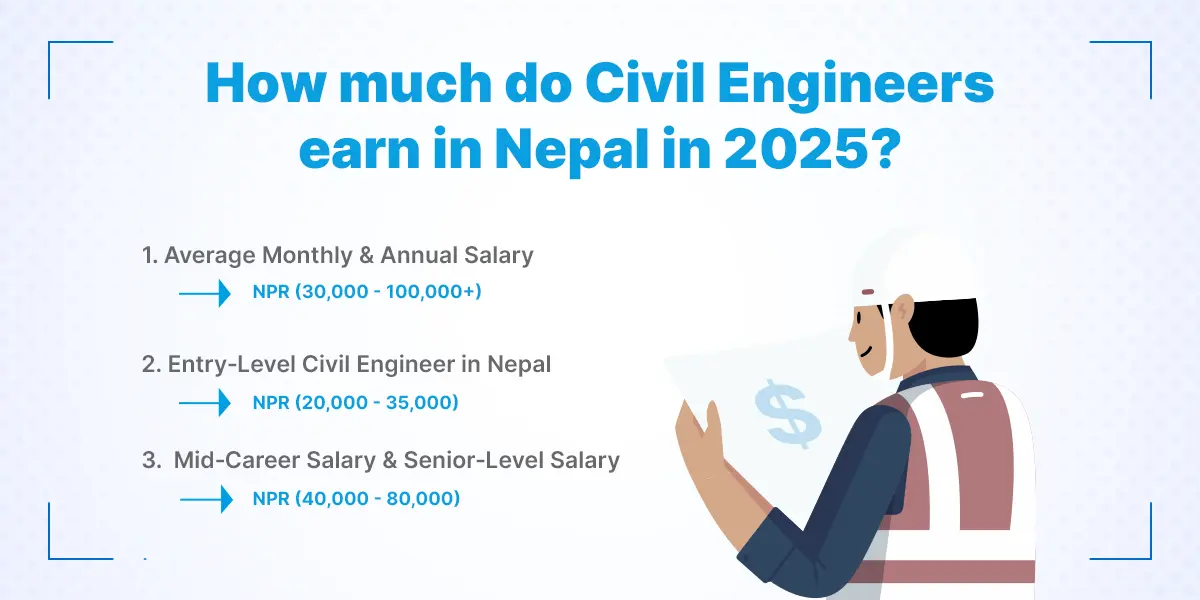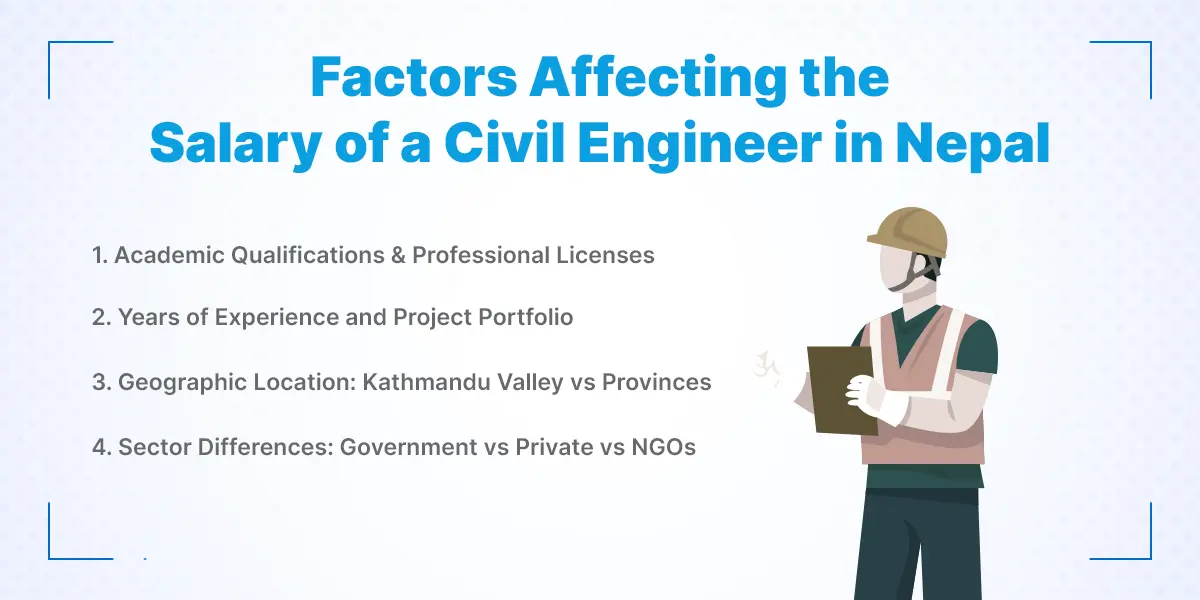
Thinking of starting a career as a civil engineer in Nepal? Or are you already an engineer, doubting whether your salary matches the market? You're not alone. This is one of the most searched career questions of the day. With numerous projects underway across the country, ranging from highways to hydropower, the demand for skilled civil engineers is increasing rapidly.
But here is the million-dollar question: how much do civil engineers really earn in Nepal in 2025? In this blog, we will explore the salary of a civil engineer in Nepal, comparing government versus private pay, the factors that affect earnings, and strategies for increasing earnings. No matter if you are a student, job seeker, or already employed in the profession, this guide will show you the clean image of civil engineering salary trends in Nepal.
In this blog
- How much do Civil Engineers earn in Nepal in 2025?
- Factors Affecting the Salary of a Civil Engineer in Nepal
- Government vs Private Sector: Which Pays Civil Engineers More in Nepal?
- Looking for Civil Engineering Jobs in Nepal?
- How to Increase Your Salary as a Civil Engineer in Nepal?
- Salary of a Civil Engineer in Nepal vs Neighboring Countries
- Conclusion
- Frequently Asked Questions
How much do Civil Engineers earn in Nepal in 2025?
Nepali civil engineers in 2025 typically earn between NPR 30,000 and NPR 100,000+ per month based on their experience, skill, and the type of company they're currently employed in. That's equivalent to NPR 3.6 to over NPR 12 lakhs per annum. If you're a newcomer or thinking of switching careers, it's important to know how much civil engineers really earn so that you can better plan. Here's what you can expect in 2025.

1. Average Monthly & Annual Salary
Typically, the average monthly salary of a Nepalese civil engineer would be NPR 30,000 to 100,000. If calculated on an annual basis, this translates to approximately NPR 3.6 to 12 lakhs. However, this is an average figure. There can be engineers who are employed in big infrastructure projects or foreign consultancies and may even earn more, especially working in Kathmandu or urban areas.
Online employee postings and reviews show that the majority of engineers earn approximately NPR 40,000 to 50,000 a month, which is fairly standard among private companies. They also receive bonuses or traveling allowances depending on the specific project they work on.
Government salaries may appear lower, but they are accompanied by other perks like security of employment, pensions, and incremental rises, making them attractive in the long term.
2. What is the salary of an Entry‑Level Civil Engineer in Nepal?
As a fresh graduate, the starting salary is not that exciting. Beginner civil engineers in Nepal earn NPR 20,000 to NPR 35,000 per month. That depends on whether you're working for a small construction firm, an NGO, or a government agency. There are even firms that offer unpaid internships before offering a paid permanent job.
Many engineers start their careers by working on-site as junior engineers, where the workload is heavy, but the pay is modest. Still, this phase is crucial for gaining real project experience, which pays off later. A few larger or international companies may offer higher starting salaries around NPR 35,000 or more, especially if you’ve done internships, have software skills, or have strong academic performance.
The freshers' salary is likely to rise in around two years if they maintain consistency and are able to perform field work, analysis, or structural design.
3. Mid‑Career Salary vs Senior‑Level Salary Breakdown
With 3 to 5 years of experience, the salary increases. A mid-level civil engineer in Nepal can earn NPR 40,000 to 80,000 per month, depending on the role, field of expertise, and company they are employed with. Those having strong site management or hydropower skills command a better salary, if they have experience as a project head or have worked on several projects.
At the senior level (5+ years of experience), the salary can go even higher, between NPR 70,000 to over 120,000 per month, or more in some cases. Senior engineers working in consulting companies, foreign donor-funded projects, or big infrastructure works (like bridges, highways, or hydropower plants) can easily earn more than one lakh per month. Others even freelance or do contract-type jobs that pay on a project-by-project basis in order to get paid more freely.
And also, if you build up your skills in project management tools, AutoCAD, BIM, or get professional licenses, there is a bigger chance that you will get promoted or be able to get higher-paying jobs sooner.
Factors Affecting the Salary of a Civil Engineer in Nepal
The salary for a Nepalese civil engineer mainly depends on education, experience, location, and the sector where they are employed. For example, those who have professional licenses or master's degrees have higher salaries. Those who work in Kathmandu tend to have higher salaries than those working in rural settings. Private sector firms also offer higher salaries than government firms, but government firms provide other benefits. Let's discuss these aspects one by one to understand how they influence your salary.

1. Academic Qualifications & Professional Licenses
Your qualification level has a significant impact on your earnings as a civil engineer. Usually, a bachelor's degree in civil engineering is the minimum entry requirement for most posts. But engineers holding a master's degree or special certificates tend to earn more because they carry special knowledge and expertise.
Most engineers who continue to learn with project management training, AutoCAD, BIM (Building Information Modeling), or even specialized areas like hydropower also have better chances of being awarded salary hikes. Employers value such proficiency because it increases project efficiency and quality.
2. Years of Experience and Project Portfolio
Experience is one of the strongest factors influencing your pay growth. When you are a new graduate, you may start with a minimum pay, but as you accumulate more years of work experience, your pay increases. Experience improves your ability to work on complex projects, lead teams, and solve real-world problems.
It is also significant to have a good project portfolio. Working on big projects like highways, bridges, or hydropower plants means that you gain excellent skills that most companies seek. This can boost your income as you can bring actual results.
Mid-level engineers who have 3-5 years of experience typically see their salary rise by 30-50% above starting pay. Experienced high-level engineers with over 5 years of experience, especially those who are in management or specialized fields, can double or triple their original salaries.
3. Geographic Location: Kathmandu Valley vs Provinces
Where you work in Nepal does have an effect on pay. Engineers employed in the Kathmandu and city areas tend to get more money than those working in other provinces. This is because Kathmandu has most of the government ministries, large private firms, and foreign companies.
The cost of living is higher in Kathmandu, and companies therefore offer higher salaries to hire qualified engineers. In contrast, salaries are lower in most of the provinces, and they may be limited or may only be available in small projects.
There are certain remote areas with major infrastructure projects, such as hydropower stations in the hills, which may offer competitive salaries along with allowances to attract engineers to work there.
4. Sector Differences: Government vs Private vs NGOs
Your working sector also influences your compensation and benefits.
Government job typically offers stable pay with periodic increases, job security, and benefits like pensions, social security, and housing allowance. However, the starting pay might be lower than in private enterprises.
Private companies and construction firms typically offer higher base pay, especially in Kathmandu or for large projects. Such employment comes with bonuses based on the project's success, but may offer fewer opportunities for job security and long-term benefits.
NGOs and international organizations may offer competitive pay and other benefits like travel allowance, training, and insurance coverage. Such employment may require specialized skills or experience in the project.
Government vs Private Sector: Which Pays Civil Engineers More in Nepal?
If you are a Nepali civil engineer, one of the key questions you will likely ask yourself is: "Should I join the government or private sector?" Both have their pros and cons, especially when it comes to salary, benefits, and job security. Let's break down how each measures up so that you can decide what best fits you.
1. Base Salary Comparison
For base salary, private companies are usually more profitable than government jobs. Construction companies, consulting firms, or overseas projects typically offer engineers higher starting salaries in an effort to attract them from other opportunities.
For instance, a fresh civil engineer in a private company in Kathmandu can begin with a salary of about NPR 25,000 to 35,000, whereas the government can begin around NPR 15,000 to 25,000. Mid-level engineers are paid between NPR 40,000 and 70,000 in the private sector, while in government, it could be NPR 30,000 and 50,000.
Private companies are more competitive and dynamic in their salary offerings, especially for engineers with strong skills or working in specialized areas like hydropower or structural design. They would rather pay the engineers with more skills to keep them.
2. Allowances, Bonuses & Job Security
Though private firms pay higher basic salaries, government jobs have some perks that are valuable for most engineers.
Allowances and Bonuses
Government employees typically get a range of allowances over their minimum pay. These may include housing allowances, transport allowances, medical benefits, and others. All these significantly add to the total compensation package.
On the other hand, private sector employers occasionally offer project performance or firm-related bonuses, which are enjoyable only when projects go well. These are usually not guaranteed, however, and can vary from year to year.
Job Security
This is where government work is superior. You generally have more job security overall while working in the government. Layoffs and pay cuts are rare. Advances and raises usually follow a fixed pattern based on years of experience and service. This security appeals to many who desire a steady income without fear of uncertain job prospects.
In the private sector, job security is less guaranteed. If the firm loses a contract or runs into financial difficulties, engineers could end up being laid off or having their salaries frozen. Contracts may be short-term, depending on the project duration.
3. Other Benefits and Growth Opportunities
In addition to allowance, the government civil engineers are also offered social security schemes like the Social Security Fund (SSF), retirement pensions, paid leaves, and other welfare programs. The benefits guarantee long-term financial security.
Private companies may offer training opportunities, performance-based incentives, and faster career advancement. Engineers also gain experience doing different kinds of projects, which improves their resumes. Private companies occasionally pay for overtime or working in difficult locations.
4. Which One Should You Choose?
If you require a higher immediate salary and can handle job risk, private sector employment may be the best choice. You are paid more immediately and have a chance to move up quickly, especially if you have the right skills and credentials.
If stable earnings, long-term benefits, and job security are your thing, then government jobs are more suitable. They may pay you less at first, but the allowance, pension, and steady rise make up for it.
Most civil engineers actually start out in government jobs for security and move to the private sector later to maximize their pay and experience.
Looking for Civil Engineering Jobs in Nepal?
Find the best civil engineering jobs in Nepal with Kumari Job. Explore thousands of vacancies and start your career growth today!
How to Increase Your Salary as a Civil Engineer in Nepal?
The best method to increase your salary as a civil engineer in Nepal is to further develop your skills and get actual project experience. The majority of engineers make more money simply because they have the right equipment, a powerful network, or put some extra effort into their main job. Whether you are a fresher or a professional, there are obvious ways to get your pay increased. Let's walk through the three most effective ones.
1. In‑Demand Technical Skills & Software
Learning the right tools can greatly boost your job prospects and salary. Most of the civil engineering companies in Nepal look for people who know software like AutoCAD, ETABS, SAP2000, STAAD Pro, and SketchUp. These are used for designing, analyzing, and modeling. If you can use them well, you become more valuable to the companies.
Almost all large projects also desire engineers experienced with BIM (Building Information Modeling) or GIS (Geographic Information Systems). They are highly desired and will help you rise in international projects as well as in private companies.
You don't need to be a software degree holder to learn them. There are short training courses in Kathmandu and online. You can do more complex things and lead teams when you master these tools, and negotiate a better pay with confidence.
2. Professional Certifications & Postgraduate Degrees
Another method to increase your salary is through education, not just holding a degree, but also obtaining certifications that reflect your superior level of knowledge.
For instance, becoming licensed as a Registered Engineer in Nepal or achieving certifications such as Project Management Professional (PMP), Quantity Surveying, or Construction Safety Management can lead to higher-paying employment. Businesses have confidence in engineers holding official certifications, particularly for management or international positions.
If you wish to develop your career in the long term, pursue a Master's in Civil Engineering or a specialized postgraduate diploma in hydropower, structural engineering, or transportation planning. All these are fields where Nepal does not have sufficient specialists, and being one among them will help you negotiate much higher salaries, even double your initial pay.
3. Networking, Freelance Consulting & Side Projects
Sometimes the connections you make are as valuable as your knowledge. Building networks with engineers, contractors, and company managers can help you find better job opportunities.
Attend seminars, join engineering forums, or even stay engaged with IOE alumni associations or your college's alumni association. They can keep you up-to-date. Your network contacts may provide you with a tip on freelance work, part-time projects, or higher-paying full-time jobs.
You may also think of freelance consulting, e.g., designing house plans, determining construction costs, or managing small jobs on a part-time basis. These extra jobs may be lower-paid than your full-time employment, but they can give you extra income and some prestige.
Salary of a Civil Engineer in Nepal vs Neighboring Countries
Civil engineers in countries like India, China, the USA, the UK, and Australia earn much more than in Nepal. However, living costs vary greatly, which affects how much money truly goes further. The table below shows average salaries in each country, so you can see both headline pay and the lifestyle that comes with it.
| Country | Avg Annual Salary (USD) | Avg Monthly Salary (USD) | Notes on Living Costs & Value |
|---|---|---|---|
| Nepal | $5,000 | $420 | The lowest base cost of living is low |
| India | $14,500 | $1,200 | Roughly 3× Nepal; major cities costlier |
| China | $40,000 | $3,300 | Mid-tier; living costs are moderate |
| Australia | $60,000 | $5,000 | High salary, high cost, but strong purchasing power |
| UK | $55,000 | $4,500 | Strong mid-range pay, taxes, and housing are moderate |
| USA | $100,000 | $7,329 | Highest pay, high cost, strong purchasing power |
Conclusion
In 2025, civil engineer salaries in Nepal vary a lot based on experience, location, and the type of work. New engineers might make around NPR 20,000–30,000, while those with more experience can earn over NPR 70,000, especially in private companies or major projects. Government jobs usually offer more stability and benefits, but private jobs often pay better and allow for quicker growth.
When we look at salaries in countries like India, China, Australia, the UK, or the USA, it's clear that engineers there earn much more. However, not everyone needs to go abroad to improve their careers. Engineers in Nepal can increase their income and career by learning new software, getting professional licenses, taking extra projects, or freelancing.
Want to earn from home or work with international clients? Online jobs are a great way to build income, gain experience, and work on your own terms.







Loading Comments...